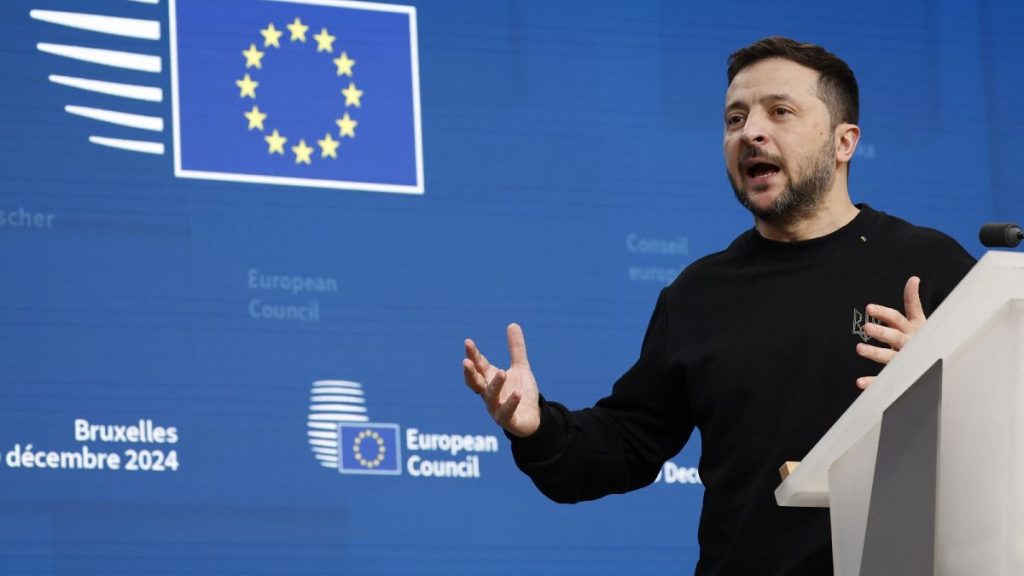Ukrainian President Volodymyr Zelenskyy addressed several crucial issues during his visit to Brussels, primarily focusing on the ongoing war with Russia and the necessity of continued Western support. He dismissed a Hungarian proposal for a Christmas ceasefire and prisoner exchange, branding it a political maneuver lacking seriousness. Zelenskyy emphasized that any negotiation regarding the conflict must involve Ukraine directly, highlighting that the war is occurring on Ukrainian soil, thus rendering any third-party proposals without Ukrainian involvement futile. He also questioned Hungary’s ability to mediate given its perceived close ties with Russian President Vladimir Putin. While acknowledging the importance of prisoner exchanges, having facilitated the return of over 3,500 Ukrainians, he viewed the Hungarian proposal as lacking genuine intent, particularly in the absence of concrete security guarantees.
Zelenskyy underscored that a ceasefire can only be considered if coupled with robust security guarantees, as simply freezing the conflict without addressing the underlying causes would be ineffective. He reiterated that Ukraine’s ultimate goal is a stable peace, a prospect he believes Russia is not genuinely interested in. He stressed the importance of not merely pausing the war, but achieving a resolution that ensures long-term stability and prevents future conflict. This, he argued, necessitates addressing the root causes of the conflict and not simply implementing a temporary cessation of hostilities. He highlighted Russia’s continued aggression and lack of commitment to a peaceful resolution, emphasizing the need for sustained pressure and support from international allies.
The Ukrainian president emphasized the necessity of continued US and European unity in supporting Ukraine. He expressed hope for future discussions with returning US President Donald Trump, highlighting the former president’s strength and the potential for renewed US engagement in resolving the conflict. Zelenskyy explicitly characterized Putin as “crazy” and “dangerous,” emphasizing the threat he poses to global security. He further appealed for additional military aid, specifically citing the need for air defense systems to protect critical infrastructure like nuclear power plants, which have been repeatedly targeted by Russian forces.
Zelenskyy’s plea for air defense systems underscores the strategic importance of protecting Ukraine’s energy infrastructure. These systems are crucial not only for maintaining essential services for Ukrainian citizens but also for preventing further escalation of the conflict. The targeting of nuclear plants, in particular, raises grave concerns about potential catastrophic consequences, emphasizing the urgent need for enhanced protective measures. This appeal extends beyond air defense systems to encompass fighter jets, missiles, ammunition, and other vital military equipment, reflecting the dire situation on the ground and the urgent need for increased military support from Western allies.
The Ukrainian president candidly admitted that some Ukrainian brigades are currently underequipped, highlighting the critical need for ongoing military assistance. This acknowledgement further emphasizes the significance of Western support in enabling Ukraine to effectively defend itself. The lack of sufficient equipment puts Ukrainian forces at a significant disadvantage, impacting their ability to counter Russian offensives and protect civilian populations. This appeal for increased military aid underscores the urgency of the situation and the potential consequences of failing to provide adequate support. Zelenskyy’s plea to Western allies reflects the dire reality of the war and the critical need for sustained and increased military aid to bolster Ukraine’s defense capabilities.
The overall message from President Zelenskyy was one of urgent appeal for continued and strengthened support from Western allies. He emphasized the critical need for both military aid and diplomatic pressure to achieve a lasting and peaceful resolution to the conflict. His assessment of the situation on the ground highlights the significant challenges faced by Ukrainian forces and the importance of ongoing assistance in ensuring their ability to defend their country. He underscored the necessity of a comprehensive approach involving both military and diplomatic efforts, emphasizing the need for sustained international cooperation to address the multifaceted challenges posed by the ongoing conflict.

